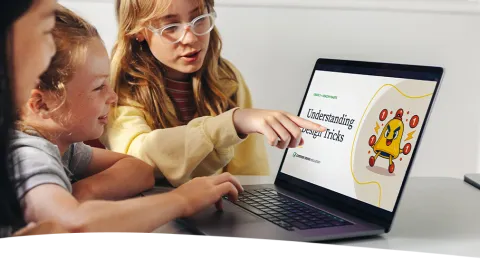
Digital Citizenship Week is October 20–24!
Join teachers worldwide to promote a healthy, positive approach to media and tech.
Take a look inside 14 images
Cast Your Vote
Pros: Feels very modern, and gets students to reflect on their positions on important issues.
Cons: Students can't access previous notes during Town Hall meetings, and the scorecard at the end is a bit reductive.
Bottom Line: This game valuably shows students the importance of researching candidates and how to do it, and along the way gets students to define their political points of view.
Teachers can use Cast Your Vote as part of a lesson on the election cycle and voting, whether prompted by a political debate, campaign news, or just researching candidates and propositions prior to an election. Along the way, teachers can cover ways that students can discuss controversial political issues responsibly and persuade others to their side. During play, students will need to decide which issues are most important to them, which can be a great lead-in to a larger lesson on political argumentation and persuasion. Cast Your Vote usefully provides pre- and post-game resources that'll help students understand what's at stake in the debates and in the choices people make when they vote.
Teachers could have students work together, but, if possible, it's best to have students work through this game individually, since they'll eventually need to decide on the issues for themselves and cast their own ballot. Students who have a hard time with short-term memory should be encouraged to take some additional notes on paper, making it easier to remember which questions they want to ask at the Town Halls and which candidates to research further. The game includes the option of playing in Spanish, and has a number of accessibility options.
Once students are done playing the game, it'd be great to have students -- during an actual election season -- apply what they've learned to real life. Ask students to watch debates, visit the candidates' websites or social media, and take notes to determine the best candidate. As a final assessment, students could write an essay explaining how well their chosen candidate matches with the issues that are important to them and their personal values.
In Cast Your Vote, one of the many games in the iCivics collection, students vote in local elections in their town of Isley. They start by voting in a primary election that they don't prepare much for and won't know who to choose. This helps make the point right from the start that voters should do their homework. Students' mission from that point is to prepare for the general election, which is a few weeks away (in game time). To kick things off, students fill out a survey choosing five to seven issues (e.g., crime rate, education, health access, water quality, minimum wage, and green spaces) that are the most important to them, marking one as a "must have" in a candidate. Students then track candidates' positions on these issues.
Students attend Town Hall debates where they can question the candidates on the issues they care about. During these debates, students must take careful notes. There are also days when they stay home and do research, reading their email, reading the news, and delving into directed internet searches on the candidates. Students can flag problematic notes to help them decide how to vote later. As the days go on, students unlock more "apps" for their in-game computer, giving them more research and note-taking options. Students also have the opportunity to vote for or against a couple of propositions, one on single-use plastics and one on whether to elect judges through popular vote instead of by appointment. There's also a glossary of terms. As the days go on, students become informed voters, figuring out how they feel about important issues, researching candidates and propositions, and deciding how to vote in the end.
Later in the game, more surveys help students narrow down their values, and the Candidate Notes Analyzer helps students correct a limited number of incorrect notes. Students will need to do dedicated research on their in-game computer about the propositions, since those aren't covered during the Town Hall debates. In the end, students study their notes and choose which candidates and propositions to vote for on election day. After submitting their ballot, they receive an evaluation on how well they based their choices on what they claimed to be the most important issues.
Full Disclosure: iCivics and Common Sense Education share a funder; however, that relationship does not impact Common Sense Education's editorial independence and this learning rating.
Cast Your Vote gives students an opportunity to experience an election cycle, learning how to choose issues important to them and how to research candidates and issues to inform their vote on election day. They'll listen carefully to what candidates have to say and take notes and identify red flags. Candidates are not cut-and-dry stereotypes and do a good job of reflecting modern-day political parties, so it really gives students a chance to examine their individual priorities. Interestingly, students aren't allowed to research anything before voting in the primary election, but this makes the point that they must be better prepared for the general election. This might frustrate some players, so teachers should invite them to reflect on why they're frustrated and how they could avoid that in real life.
The extra classroom materials are worth using, since they get students primed on the issues -- and their own feelings on them -- before the game. Then inside the game, they'll learn the kinds of information to look for when evaluating candidates and issues, places to look for information, and how to evaluate candidates based on their qualifications, voting record, and endorsements. Students evaluate information from the news and from candidate emails, decide how well each candidate's positions match their own, and look at the big picture to choose how to vote in the general election. But, in the end, considering their own stances on these real, topical issues and researching the candidates and propositions is the big takeaway here; students will use these skills once they become registered voters.
The scoring at the end of the game -- particularly the issue alignment percentage -- can be tricky to interpret, since it's based on how well a student's candidate aligns with the student's values. In practice, however, students might learn a particular candidate that aligns well with their favored issues is corrupt and decide to vote for someone else. This can appear like a poor choice, but for the student it was nuanced. This helps students learn that deciding who and what to vote for isn't always simple, but it'd help if this complexity was better incorporated in the assessment. Still, teachers could invite students to discuss their choices and thought process when they voted for a candidate that didn't have the highest issue alignment percentage.























